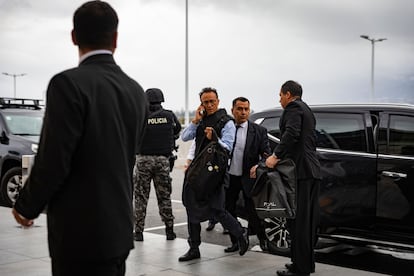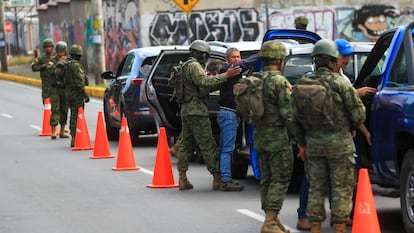Ecuadorians go to the polls in search of a president who will give them back their country
The presidential election campaign has been marked by violence and the assassination of one of the candidates amid a wave of organized crime-related terror

Few people can claim to have been closer to all the presidents of Ecuador over the last century than the Salazar family. From the Amazonas Hair Salon, one of the low-rise business next to the Carondelet Palace presidential residence, Clara Salazar has seen a country change from the Plaza Grande, the focal point of the Ecuadorian capital, while her father cut the hair of local residents. She recalls above all the tranquility that reigned: there was always an absent-minded customer who remembered they needed a haircut at 8 p.m., when the city was in darkness. Now the salon closes at 5 p.m. When the sun begins to set, the Plaza Grande empties. “People run home out of fear,” Salazar explains as he shaves the sides of a child’s head. From the basement of the president’s house to the farthest corner of Ecuador, insecurity has gripped a country that for many years thought it was safe from violence. On Sunday, it will go to the polls to elect a new president under a shroud of terror.
In Salazar’s opinion, everything was “much better” under former president Rafael Correa, so she will vote for the candidate running for Correa’s Citizen Revolution Movement, Luisa González. Alba Castro, 60 years, walks through the door of the salon, announcing loudly that she has come to make her husband handsome, adding: “On Sunday we will bury the socialism that wants to lead us to the abyss.” Salazar receives her with a smile and responds warmly: “let’s wait for the result.” Mrs. Castro pays her little attention: “I am going to vote for our angel who is in heaven: Fernando Villavicencio.”
If the focus of the Ecuadorian elections had been the possible return to power of Correísmo since May, now it is on the assassination of presidential candidate Fernando Villavicencio, of the Construye movement, as he left a rally on August 9. It was a killing that laid bare to Ecuadorians the depths of the pit of violence into which they have been sinking for the last three years. Villavicencio was not among the favorites to advance to the second round, although he had become known for speaking out against corruption and organized crime, which led to him receiving death threats. A friend of his, investigative journalist Christian Zurita, will replace Villavicencio in Sunday’s vote, but with no material time for changes, 13.5 million voters will see the face and name of the dead candidate on the ballot.

It is impossible to gauge the effects of Villavicencio’s assassination on the electoral race. The most recent published polls had Luisa González in the lead, although far from a decisive victory in the first round with her support standing at around 30%. The big unknown, if the polls are accurate, is who of the other seven candidates will accompany González to the run-off vote in October. A campaign marked by violence could ultimately benefit Otto Sonnenholzner, the former vice-president in the Lenín Moreno administration (2017-2021), and Jan Topic, the so-called “Ecuadorian Bukele” due to his hardline approach to security and imposing the rule of law.
Patricia Toasa doesn’t support either Sonnenholzner or Topic. From her mobile stall selling soft drinks, candy, and cigarettes, she has been touring the city for 33 years. On many occasions, she secures a privileged corner of the Plaza Grande, from where she has witnessed the highest officials in the country come and go at the presidential palace over the years. She has seen them all, but only one ever spoke to her, she says with a twinkle in her eye. It was a Saturday between 2007 and 2017. President Correa was on his way back to the Carondelet Palace when he stopped to chat with Toasa, called her compañerita, and gave her a kiss. “What president is going to kiss me!” she laughs, revealing her gold-rimmed teeth. And that kiss is well worth his eternal vote, because although Correa moved to Belgium in 2017 and has not returned to Ecuador due to a corruption conviction, which he says is a case of political persecution, the former president continues to hold sway over Correísmo, the political movement built around him. To vote for González is to vote for Correa. A martyr for some and executioner to others, the former president continues to star in national politics.
These early elections, called when Guillermo Lasso dissolved parliament in May to avoid an impeachment vote — a move that in Ecuadorian politics is known as “mutual death” — have come at the best possible moment for Correísmo since the fall from grace of its former leader. The Citizen Revolution Movement, which Correa manages from a distance, won the local and regional elections in February. The former president felt that Lasso was handing Correísmo victory on a platter. That self-sufficiency half-cracked in the days after Villavicencio’s assassination, when Correa appeared more concerned than usual: uncertainty had already gripped Ecuador.
“Who do we vote for?” asks Imelda Chango, 69, as she grabs the hand of Reyna Morocho, 26, dressed in glitter and wearing a sash that reads Miss Star Ecuador 2023. The young beauty queen walks around downtown Quito taking pictures with the young and old because she is preparing, she explains, for an international pageant to be held in Barcelona. Chango asks Morocho which way she is leaning and the young woman, as if she were in front of the contest jury, responds without endorsing any candidate: “Ecuador is on its knees, crime is out of control, someone has to get us out of here.” Mrs. Chango is satisfied with the answer. “We are terrified, but there is a God in heaven who will guide us,” she says.

Quito remains the most peaceful area of the country, although violence is beginning to permeate its streets and businesses. The hotspot is in Guayaquil and the coastal provinces, where the country’s access to the Pacific makes Ecuador a coveted territory for Mexican and Colombian drug trafficking groups. So far in 2023, 4,574 violent deaths have been recorded, while 2022 ended with the highest figure in the country’s history — 4,600 — double that of 2021. At the current rate, by the end of this year Ecuador could reach a rate of 40 homicides per 100,000 inhabitants, which would place it among the most violent countries in the world.
In Guayaquil, the country’s second city, the climate is unbreathable. Ashly Silva is a mother of four children who have been forced to flee their home in Isla Trinitaria, south of Guayaquil, where shootings and deaths number in the hundreds. She works cleaning houses after her husband was killed by micro-trafficking drug networks a year ago. All she asks if for a presidential candidate who has “the courage to confront drug traffickers.” Although she does not endorse any of them, she thinks that Correísmo is living in the past and that the country has to look to the future with a primary objective: to put an end to the killings.
Whoever is elected president will have to deal with this scenario of violence and citizen insecurity in a very short period of time. Sunday’s elections do not mark the beginning of a new legislature: the next president will be installed to conclude Lasso’s mandate, giving them only 18 months in power during which Ecuadorians are asking for the return of a country they no longer recognize. “We have never seen anything like this. The dismemberments, the hanging bodies…” says cab driver Luis Noboa. “We didn’t even know that this mutual death thing existed!”
Sign up for our weekly newsletter to get more English-language news coverage from EL PAÍS USA Edition
Tu suscripción se está usando en otro dispositivo
¿Quieres añadir otro usuario a tu suscripción?
Si continúas leyendo en este dispositivo, no se podrá leer en el otro.
FlechaTu suscripción se está usando en otro dispositivo y solo puedes acceder a EL PAÍS desde un dispositivo a la vez.
Si quieres compartir tu cuenta, cambia tu suscripción a la modalidad Premium, así podrás añadir otro usuario. Cada uno accederá con su propia cuenta de email, lo que os permitirá personalizar vuestra experiencia en EL PAÍS.
¿Tienes una suscripción de empresa? Accede aquí para contratar más cuentas.
En el caso de no saber quién está usando tu cuenta, te recomendamos cambiar tu contraseña aquí.
Si decides continuar compartiendo tu cuenta, este mensaje se mostrará en tu dispositivo y en el de la otra persona que está usando tu cuenta de forma indefinida, afectando a tu experiencia de lectura. Puedes consultar aquí los términos y condiciones de la suscripción digital.








































